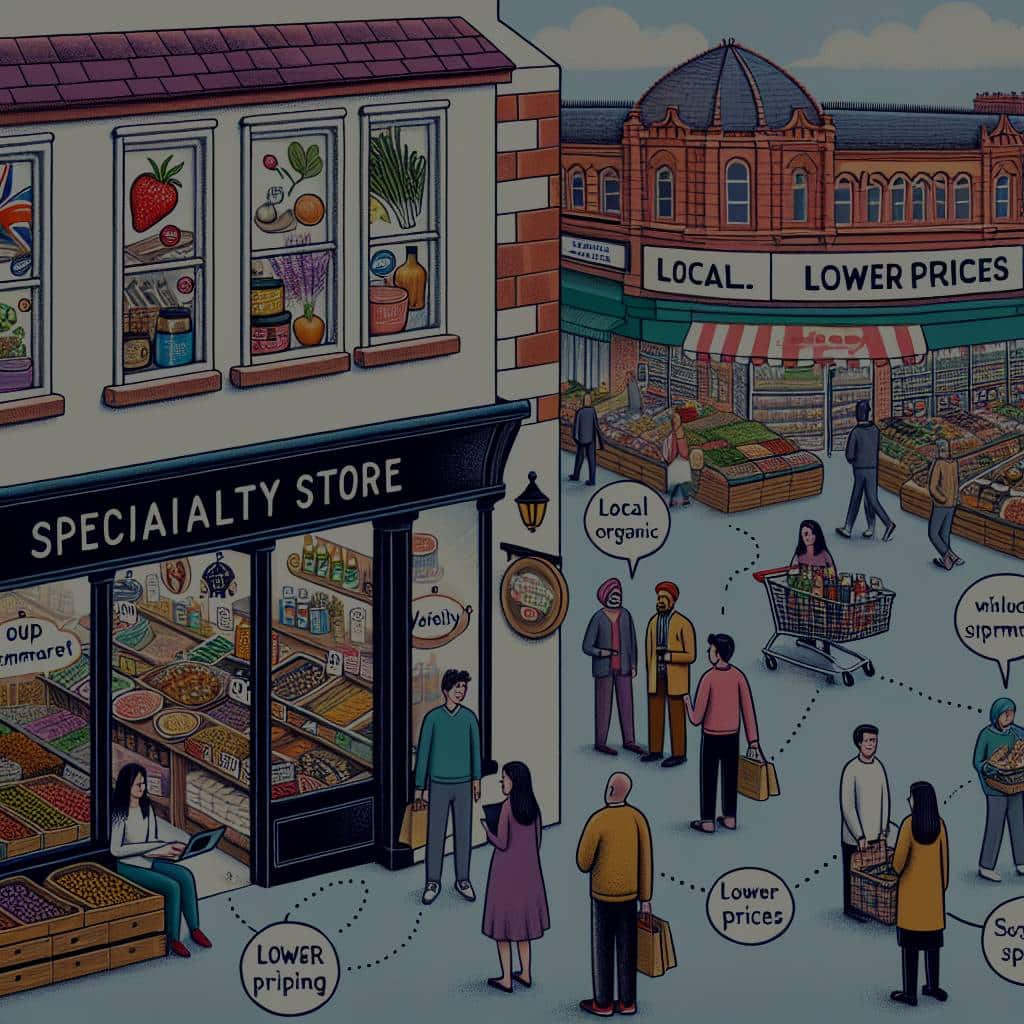How Can UK Specialty Food Stores Compete with Supermarket Chains?

In a world that is increasingly online-focused, the UK specialty food market is facing stiff competition from supermarket chains. Grocery shopping is no longer confined to physical trips to the store, as online channels pave the way for a convenient, 24/7, shop-from-home trend. Key players in the supermarket industry, such as Aldi, are consistently offering a wide variety of food items at competitive prices, making it tough for smaller, specialty food retailers to keep up. But all is not lost. This article explores effective strategies that specialty food retailers can adopt to remain relevant and competitive in the market.
Tailoring the Customer Experience
In a landscape dominated by large supermarket chains, one avenue through which specialty food stores can differentiate themselves is through the customer experience. While large retailers often focus on price and convenience, specialty stores have the opportunity to create a unique, personalized shopping experience for their customers.
A lire en complément : What Are the Best Practices for Lead Generation in UK B2B Markets?
While supermarkets offer a wide variety of products, they often can’t match the level of expertise found in specialty food stores. You, specialty retailers, can leverage this expertise to provide superior customer service, including personalized recommendations and in-depth product knowledge.
To compete effectively, you need to identify your unique selling proposition and communicate it effectively to your customers. This could be your focus on locally sourced products, exceptional customer service, or specialized product offerings. By emphasizing these unique attributes, you can create a distinctive brand identity that sets you apart from supermarket chains like Aldi.
A découvrir également : How to Leverage In-app Advertising for UK Mobile Game Developers?
Harnessing the Power of E-commerce
Online grocery retail is not just a growth channel, it’s exploding. This digital transformation has been accelerated by the recent pandemic, and it’s showing no signs of slowing down. If you, as a specialty food retailer, haven’t embraced e-commerce yet, now is the time.
Investing in a robust e-commerce platform can help you reach a broader customer base, beyond the geographical confines of your physical stores. Providing online shopping options offer convenience to consumers, allowing them to browse and purchase your products from the comfort of their homes.
Although developing an e-commerce presence can seem daunting, there are many easy-to-use platforms available that can streamline this process. From managing inventory to processing payments, these platforms provide the necessary tools to successfully operate an online store.
Prioritizing Quality over Price
While supermarket chains often compete on price, specialty food stores can use quality as their main competitive advantage. For many consumers, the quality of the food they eat is paramount, and they are often willing to pay a premium price for high-quality, unique products.
As you, specialty food retailers, often focus on a specific category of food, you can invest in sourcing the best products within that category. Whether it’s artisanal cheeses, organic vegetables, or gourmet chocolates, you can leverage your focus on quality to attract a loyal customer base.
While price is certainly important, studies have shown that today’s consumers value quality, sustainability, and ethical sourcing just as much, if not more. Therefore, by focusing on quality over price, you can differentiate yourselves from supermarket chains and appeal to consumers who prioritize these values.
Building a Community around Your Store
Specialty food stores have the unique ability to foster a sense of community among their customers. By hosting events, offering cooking classes, or simply providing a space for customers to interact, you can transform your store from a simple retail outlet into a community hub.
Such activities can create a sense of belonging among your customers, fostering loyalty and encouraging repeat business. This sense of community can be particularly appealing to consumers who feel disconnected from the impersonal, transactional nature of shopping at large supermarket chains.
Leveraging Social Media for Promotion
In today’s digital age, social media platforms are a powerful tool for promoting your products and building relationships with your customers. Through platforms like Instagram, Facebook, and Twitter, you can showcase your products, share recipes, announce sales, and interact with your customers.
By sharing high-quality photos and engaging content, you can attract potential customers and foster a sense of community online. Social media also enables you to communicate directly with your customers, providing a platform for feedback and customer service.
While supermarket chains often have large marketing budgets, social media levels the playing field, allowing small, specialty food retailers to compete. By leveraging these platforms effectively, you can increase your visibility and reach a larger audience.
Developing a Niche Market Strategy
Try to imagine a grocery market as an ecosystem. The supermarket chains like Aldi, Lidl, and Marks Spencer can be visualized as large, dominant predators, able to consume a wide variety of prey. In contrast, the specialty food stores are like small, agile creatures that survive by focusing on very specific niches.
In the grocery retailing world, developing a niche market strategy can be a powerful tool for competing against larger supermarket chains. As a specialty food retailer, you should consider focusing your efforts on a small, specific segment of the market that aligns with your unique selling proposition.
For example, a specialty food retailer might focus on selling local, organic produce, or import rare, high-quality cheeses from around the world. By focusing on a specific niche, you can cultivate a passionate, loyal customer base that values your unique product offerings and is less sensitive to price inflation.
Another aspect of a niche market strategy involves positioning your store as the go-to authority on a specific type of food or product. This involves not just selling the product but also educating customers about it. For example, if you specialize in artisanal cheeses, you might offer tasting events or workshops on pairing cheese with wine. This strategy strengthens your brand, deepens customer loyalty, and helps establish your store as a destination, not just a retail outlet.
Expanding Through Multiple Distribution Channels
The future of grocery retail is not just about physical stores or online sales—it’s about utilizing multiple distribution channels. Multi-channel retailing is a strategy that involves selling your products through several different channels, both online and offline.
As a specialty food store, you need to consider a variety of distribution channels. Understand that the traditional brick-and-mortar store may be the heart of your business, but it should not be the only way for customers to purchase from you. Other channels could include online sales through your e-commerce site, partnerships with local restaurants or hotels, or even setting up pop-up stores at local farmers’ markets or food festivals.
An effective multi-channel strategy can significantly increase your market reach, allowing you to tap into different customer segments and increase your market share. For instance, while your physical store may attract local foodies, your online store could reach busy professionals who prefer shopping online. Additionally, partnering with local restaurants or hotels could expose your products to tourists or business travelers.
Conclusion
In conclusion, while the rise of supermarket chains has certainly intensified competition in the grocery market, specialty food stores are far from being rendered obsolete. By focusing on the key areas of customer service, e-commerce, quality products, community building, social media promotion, niche market development, and multi-channel distribution, you can carve out a space in the grocery retailing market and successfully compete against larger competitors.
As the world continues to change and evolve, so too will the grocery retail market. But with flexibility, creativity, and a commitment to quality, you, specialty food retailers, can continue to thrive. Remember, it’s not about competing on the same terms as the supermarket chains—it’s about understanding your strengths and leveraging them to create a unique, compelling value proposition for your customers.
So, keep evolving, keep innovating, and most importantly, keep serving your customers the best food you can. In the grocery market, quality and authenticity always shine through.
